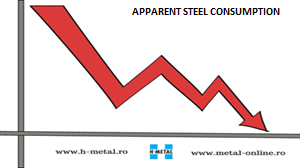Apparent steel consumption in recession in 2023

Apparent steel consumption is experiencing a recession in 2023 amid both political and economic challenges.
„The outlook for the European steel sector is getting bleaker every quarter. Global tensions, the unresolved energy crisis, high inflation, tightening economic conditions and historically high import quotas are causing production to be strangled. This situation has a negative impact on the demand for steel. It is essential that EU policymakers take urgent action to keep Europe in the global clean technology race,” said Axel Eggert, Director General of EUROFER.
In the second quarter of 2023, the apparent consumption of steel registered the fifth consecutive decrease (-7.6%), totaling 35.6 million tons.
This volume, although higher than the previous quarter, is still below the levels of 2021 and the first half of 2022. The negative trend is expected to continue for at least another quarter. Thus, we will record a deeper reduction in apparent steel consumption for the whole of 2023 (-5.2%, previous estimate -3%).
It marks the fourth annual recession in the last five years (-7.2% in 2022). In 2024, a stronger recovery is expected (+7.6% from +6.2%). But this recovery is conditioned by the still very uncertain positive developments of the industrial prospects and the demand for steel.
APPARENT STEEL CONSUMPTION INFLUENCED BY THE ISRAEL – HAMAS CONFLICT
The European economy is preparing for the ripple effects of the escalating conflict between Israel and Hamas. This conflict could destroy the feeling that things are starting to look more positive 20 months after the invasion of Ukraine by Russia.
Disruptions are expected in the supply chains for oil, steel and various metals. Indeed, if prolonged, the conflict could negatively affect steel prices, as well as many other goods.
Directly, the prolonged conflict could seriously affect steel exports from Turkey to Israel and disrupt the supply of scrap metal from Israel to Turkey.
<< Inapoi